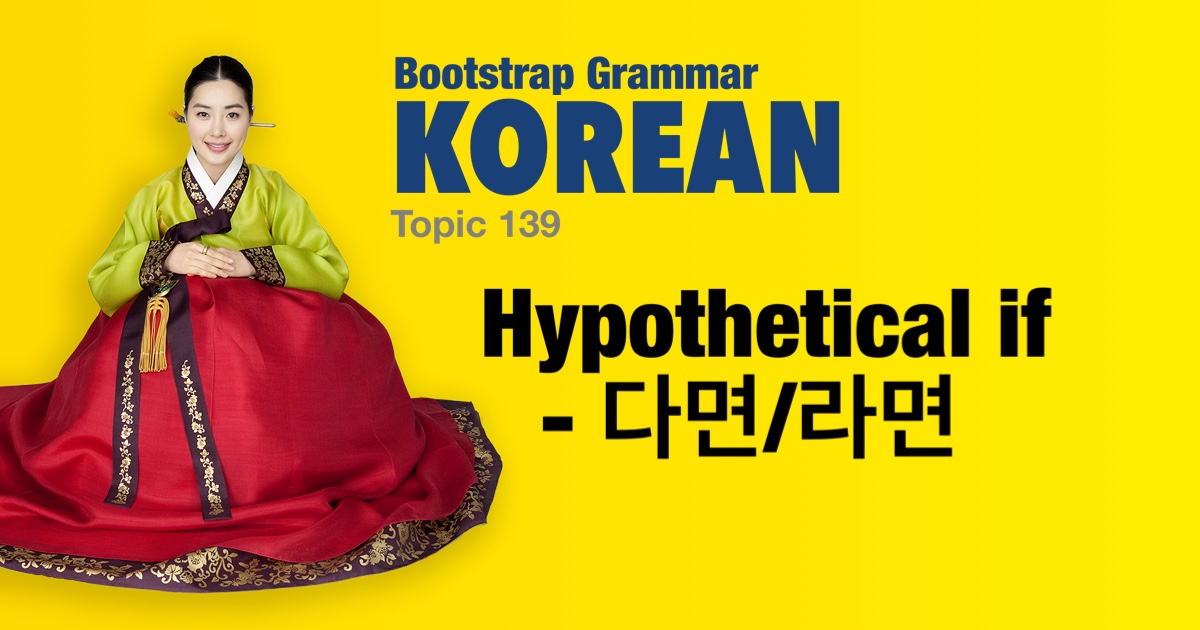Korean grammar - Hypothetical if - 다면/라면 |
|||
|
|||
Pattern: Verb stem + ㄴ/는다면; Noun + (이)라면 The pattern Verb stem + (ㄴ/는) 다면 and Noun + (이)라면 is used to express hypotheticals or when talking about something that is unlikely to happen. • Action verb: Verb stem + ㄴ/는다면 • Descriptive verb: Verb stem + 다면 • Noun + 이다 (to be): Noun + (이)라면 This pattern is similar to the simple (으)면 (if, when) ending though the emphasis in this case is more on being hypothetical. Very commonly it is combined with 좋겠어요 (would be good/great) to express a hypothetical wish. |
| Examples: | |
|
열 개 사신다면 한 개를 무료로 드릴 거예요.
If (you) buy ten, (we) will give you one free.
|
|
|
만약 이름을 바꾼다면 어떤 이름이 좋아요?
If you could change your name, which one would you like?
|
|
|
다시 어린 시절로 돌아간다면 친구들을 많이 사귀고 싶어요.
If I could go back to my childhood, I would like to make many friends.
|
|
|
지금 일어나지 않는다면 학교에 늦을 거예요.
If (you) don't get up now, (you) will be late for school.
|
|
|
감사의 마음을 전하길 원한다면 이 선물이 좋을 것 같네요.
If you want to show your appreciation, this gift would be great.
|
|
|
다시 태어난다면 새가 되고 싶어요.
If I were to be reborn, I would want to become a bird.
|
|
|
부자가 된다면 가난한 사람들을 돕고 싶어요.
When/if I get rich, I would want help the poor.
|
|
|
행동하지 않는다면 아무 일도 일어나지 않을 거예요.
If you don't act, nothing will happen.
|
|
|
한국어를 잘하게 된다면 한국에서 일하고 싶어요.
If I could speak Korean well, I would want to work in Korea.
|
|
|
복권에 당첨된다면 자선단체에 다 기부하고 싶어요.
If I were to win the lottery, I would want to donate it all to charity.
|
|
|
책을 선물한다면 경민이는 싫어할 것 같아요.
If (you) give (him) a book as a gift, (I) think Kyungmin will not like it.
|
|
|
일 년 동안 여행할 수 있다면 배로 세계 일주를 할 거예요.
If (I) could travel for a year (I) would sail around the world.
|
|
|
복권에 당첨된다면 멋진 자동차를 사고 싶어요.
If (I) won the lottery, (I) would want to buy a fancy car.
|
|
|
십 년 전으로 돌아간다면 더 열심히 공부하고 싶어요.
If (I) were to go back to ten years ago, (I) would want to study even harder.
|
|
|
좋은 일이 생긴다면 제일 먼저 알려드릴게요.
If something good happens, (I) will let (you) know first.
|
|
|
열심히 연습한다면 올림픽에서 금메달을 딸 수 있을 거예요.
If (you) practice hard, (you) will be able win a gold medal at the Olympics.
|
|
|
비가 오지 않는다면 같이 갑시다.
If it doesn't rain, let's go together.
|
|
|
내일 눈이 온다면 길이 막힐 거예요.
If it snows tomorrow, the road will be blocked.
|
|
|
집에 일찍 도착한다면 빨래를 할 거예요.
If (I) get home early, (I) will do the laundry.
|
|
|
내년에 취직한다면 좋겠어요.
(I) wish (I) could get a job next year.
|
|
|
자주 연락해 주신다면 좋겠어요.
(I) wish (you) would contact (me) more often.
|
|
|
음식을 남기지 않고 다 드신다면 좋겠어요.
(I) wish (you) could eat the whole thing without leaving any food.
|
|
|
날씨가 계속 나쁘면 경기를 연기할 거예요.
If the weather continues to be bad, the game will be postponed.
|
|
|
배가 고프다면 일에 집중하는 것이 힘들어요.
If (I) am hungry it’s difficult to concentrate on work.
|
|
|
무서움을 잘 타면 아마도 다른 영화를 봐야 해요.
If (you) get scared easily, maybe (you) should watch a different movie.
|
|
|
행복하다면 일을 더 잘하겠죠.
If (I) were happy, (I) would do a better job, wouldn't I?
|
|
|
슬프다면 친구를 만나지 않을 거예요.
If (I) am sad, (I) won't see my friends.
|
|
|
제가 대통령이라면 일 년 365일을 공휴일로 만들 거예요.
If I were president 365 days (in a year) would be a holiday.
|
|
|
제가 너라면 친구한테 사과할 거예요.
If I were you (I) would apologise to (your) friend.
|
|
|
제가 부자라면 가난한 사람들을 도와줄 수 있어요.
If I were a rich person, (I) could help the poor.
|
|
|
유명한 배우이라면 지금보다 돈을 많이 벌 거예요.
If (I) were a famous actor (I) would earn a lot more money than (I) do now.
|
|
 |
|




